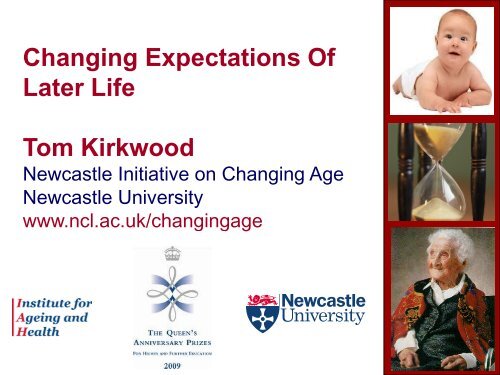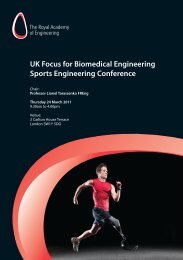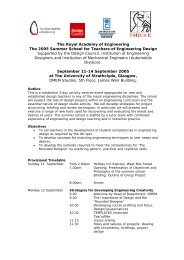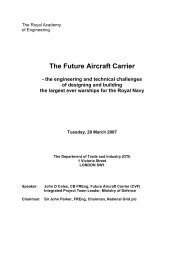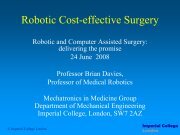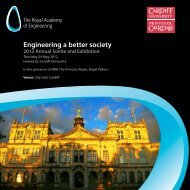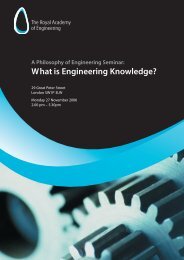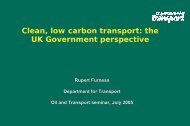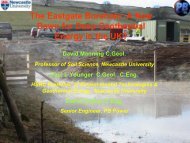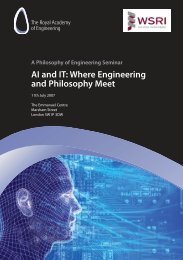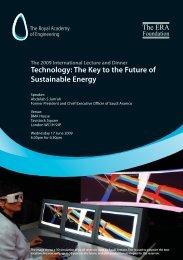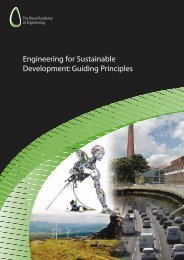Download Tom Kirkwood's presentation
Download Tom Kirkwood's presentation
Download Tom Kirkwood's presentation
You also want an ePaper? Increase the reach of your titles
YUMPU automatically turns print PDFs into web optimized ePapers that Google loves.
Changing Expectations Of<br />
Later Life<br />
<strong>Tom</strong> Kirkwood<br />
Newcastle Initiative on Changing Age<br />
Newcastle University<br />
www.ncl.ac.uk/changingage
The Challenge of Living Longer –<br />
Waking up to the 29-hour day!<br />
• Each day we have 24 hours for now,<br />
and 5 hours for later.<br />
• How good will those 5 hours be when<br />
we come to use them?<br />
• Can we make them better?
Changing Age – 1<br />
•Increased life spans represent one of humanity’s<br />
greatest achievements<br />
For the great majority of the population, health and<br />
wellbeing have improved. Illness and death have been<br />
postponed through centuries of scientific research,<br />
ingenuity and perseverance.<br />
www.ncl.ac.uk/changingage
Ageing – Historically a Rarity, Now Routine<br />
1900<br />
20 40 60 80 Age<br />
2000
Changing Age – 2<br />
•Increasing life expectancy is an economic good<br />
Longevity has made, and continues to make, an<br />
enormously positive contribution to our economy.<br />
Older people are contributors and consumers of<br />
products and services, adding substantially to<br />
economic growth.<br />
www.ncl.ac.uk/changingage
•Within the US, the economic value of the increase in<br />
life span since 1970 is estimated to have been worth<br />
$73,000,000,000,000.
Why So Slow?<br />
House of Lords Select Committee<br />
on Science and Technology,<br />
2005<br />
“We cannot understand why, with<br />
few exceptions, … companies<br />
of every size seem unable to<br />
recognise the commercial<br />
opportunities which are there<br />
for the taking.”
Changing Age – 3<br />
•Ageing concerns us all<br />
Those who are young today will in time be old. Those<br />
who are old were once young.<br />
www.ncl.ac.uk/changingage
Changing Age – 4<br />
•Each individual has an equal place in our society<br />
regardless of age<br />
The blind eye that is so often turned to the scourge of<br />
ageism, in its widespread and corrosive forms, can no<br />
longer be accepted. Ageism should be outlawed to the<br />
same extent as racism, sexism and religious<br />
discrimination.<br />
www.ncl.ac.uk/changingage
Changing Age – 5<br />
•Much better information about older people is<br />
needed<br />
We need to know about the contributions, capabilities,<br />
needs and aspirations of older people in their<br />
enormous diversity. Older people should neither be<br />
marginalised nor treated as a separate category (the<br />
elderly) within society.<br />
www.ncl.ac.uk/changingage
Factors Influencing Health Trajectories in Old Age<br />
• Genes<br />
• Nutrition<br />
• Lifestyle<br />
• Environment<br />
• Socioeconomic status<br />
• Attitude<br />
These factors and their interactions are being studied in the<br />
Newcastle 85+ Study; a 5-year prospective study in more than<br />
1000 individuals born in 1921 of the biological, clinical and<br />
psychosocial factors associated with healthy ageing.
Disease Burden Among Those Aged 85<br />
Disease count<br />
No one has perfect medical health at age 85.<br />
Yet, 78% rated their health compared with others of the same age as “good”<br />
(34%), “very good” (32%) or “excellent” (12%).<br />
Collerton et al British Medical Journal 2009
Disability Burden Among Those Aged 85<br />
A quarter of men and a sixth of women have no important functional limitation<br />
at age 85.<br />
Collerton et al British Medical Journal 2009
Changing Age – 6<br />
•Older people are an under-acknowledged asset<br />
The mental capital and skills of older people should no<br />
longer go to waste. Arbitrary ages of compulsory<br />
retirement or of exclusion from full participation in any<br />
social activity, including education, should in future be<br />
abolished.<br />
www.ncl.ac.uk/changingage
Foresight Challenge Project: Mental Capital Through Life<br />
Kirkwood et al 2008
Foresight Challenge Project: Mental Capital Through Life
Changing Age – 7<br />
•We need to use and expand our scientific<br />
knowledge about ageing<br />
Transformational reorganisation and reprioritisation of<br />
health research and service provision is needed to<br />
take account of new advances in understanding the<br />
connections between ageing and health.<br />
www.ncl.ac.uk/changingage
What happened? Why??
The Ageing Process<br />
Kirkwood Cell 2005<br />
Age-related Frailty, Disability, and Disease<br />
INFLAMMATION<br />
ANTI-INFLAMM.<br />
Accumulation of Cellular Defects<br />
GOOD<br />
LIFESTYLE<br />
GOOD<br />
FOOD<br />
STRESS<br />
Random Molecular Damage<br />
ENVIRONMENT<br />
BAD<br />
FOOD
Initiating Processes<br />
End-Stage Pathology<br />
Mechanisms Underlying Age-Related Disease<br />
Accumulation of Molecular and Cellular Damage<br />
Disease B<br />
Disease A<br />
Disease C<br />
Likely Effectiveness of Interventions
Changing Age – 8<br />
•We need urgently to adapt infrastructure for an<br />
ageing population<br />
Commitments are needed to begin as soon as<br />
possible to adapt national and local infrastructure for<br />
transport, housing, and communications to<br />
accommodate the changing age structure of our<br />
population. This will create major opportunities for<br />
industrial growth.<br />
www.ncl.ac.uk/changingage
Making It Happen<br />
•Stimulating the “user pull”.<br />
• Requires clearer recognition of what might be<br />
achieved.<br />
• Requires profound changes in attitude – a belief in,<br />
and a belief by, older people that they can cope.<br />
•Developing the “technology push”<br />
• Requires better understanding of the opportunities<br />
to improve healthy ageing.<br />
• Requires better understanding of the challenges<br />
faced by older people and of their aspirations.
• VOICE North: the regional research and engagement panel<br />
• Involving the (older) public to help us understand:<br />
What really matters?<br />
What might work best?<br />
How to structure genuine engagement?<br />
• Harnessing the public’s ideas, experience, expectations and<br />
aspirations
Barriers to Changing the Status Quo<br />
• Fatalism – “I can’t change it anyway”.<br />
• Negative stereotyping – “Old people are losers”.<br />
• Tunnel vision – “This is how it has to be”<br />
• Youth bias – “We must invest in the future!”<br />
• Restrictive accounting of costs and benefits –<br />
“Why should I pay when it’s not me that<br />
benefits?”<br />
• Lack of hard evidence – “I won’t consider it until<br />
it’s proved to work”<br />
• Short-term’ism – “I’ll deal with it when I’ve fixed<br />
the immediate crisis”.


